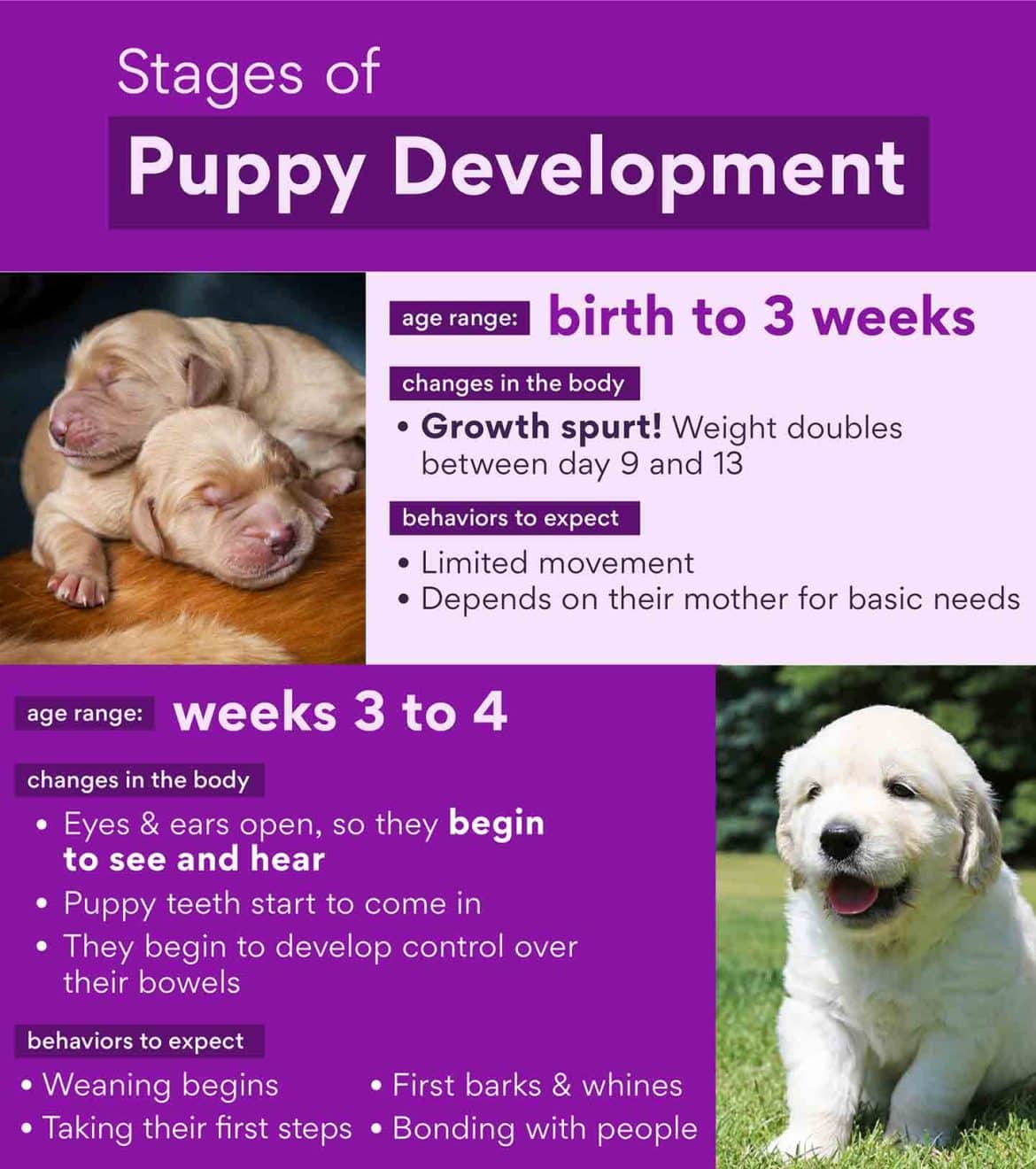Are you a proud new puppy owner, eager to understand the various stages of your furry friend's development? Look no further! In this article, we will explore the different phases that puppies go through as they grow and mature. From the adorable, playful stage to the notorious 'witching hour,' we will delve into the fascinating journey of puppyhood, providing you with valuable insights and tips along the way. So, grab a cup of tea, sit back, and get ready to gain a deeper understanding of your pup's development stages.
The Neonatal Stage
The neonatal stage is the very beginning of a puppy's life. It starts from birth until about two weeks of age. During this stage, puppies are completely dependent on their mother for survival. Their eyes and ears are closed, and they spend most of their time sleeping and nursing. They are unable to regulate their body temperature, so it's essential for them to snuggle up to their mother and littermates to stay warm.
The Transitional Stage
The transitional stage occurs between weeks two and four of a puppy's life. During this stage, their eyes and ears begin to open, and they start to gain more control over their movements. They become more aware of their surroundings and start to interact with their littermates and the environment around them. This stage is crucial for their sensory and motor development. They also start to develop baby teeth and may begin to explore solid food.

This image is property of bowwowinsurance.com.au.
The Socialization Stage
The socialization stage typically takes place between four and twelve weeks of age. It is perhaps the most critical period in a puppy's development. During this stage, puppies become more curious and adventurous. They start to explore the world around them, and their interactions with different stimuli play a vital role in shaping their behavior as adults. It is crucial for puppies to be exposed to various environments, people, animals, and sounds to help them become well-rounded, confident adult dogs.
The Juvenile Stage
The juvenile stage begins around three months of age and continues until the onset of sexual maturity, which can vary depending on the breed. During this stage, puppies continue to grow rapidly. Their baby teeth fall out, making way for their permanent teeth. They have an abundance of energy and enjoy playing, running, and exploring. Training and socialization during this stage are crucial as puppies start to establish their place in the pack hierarchy.
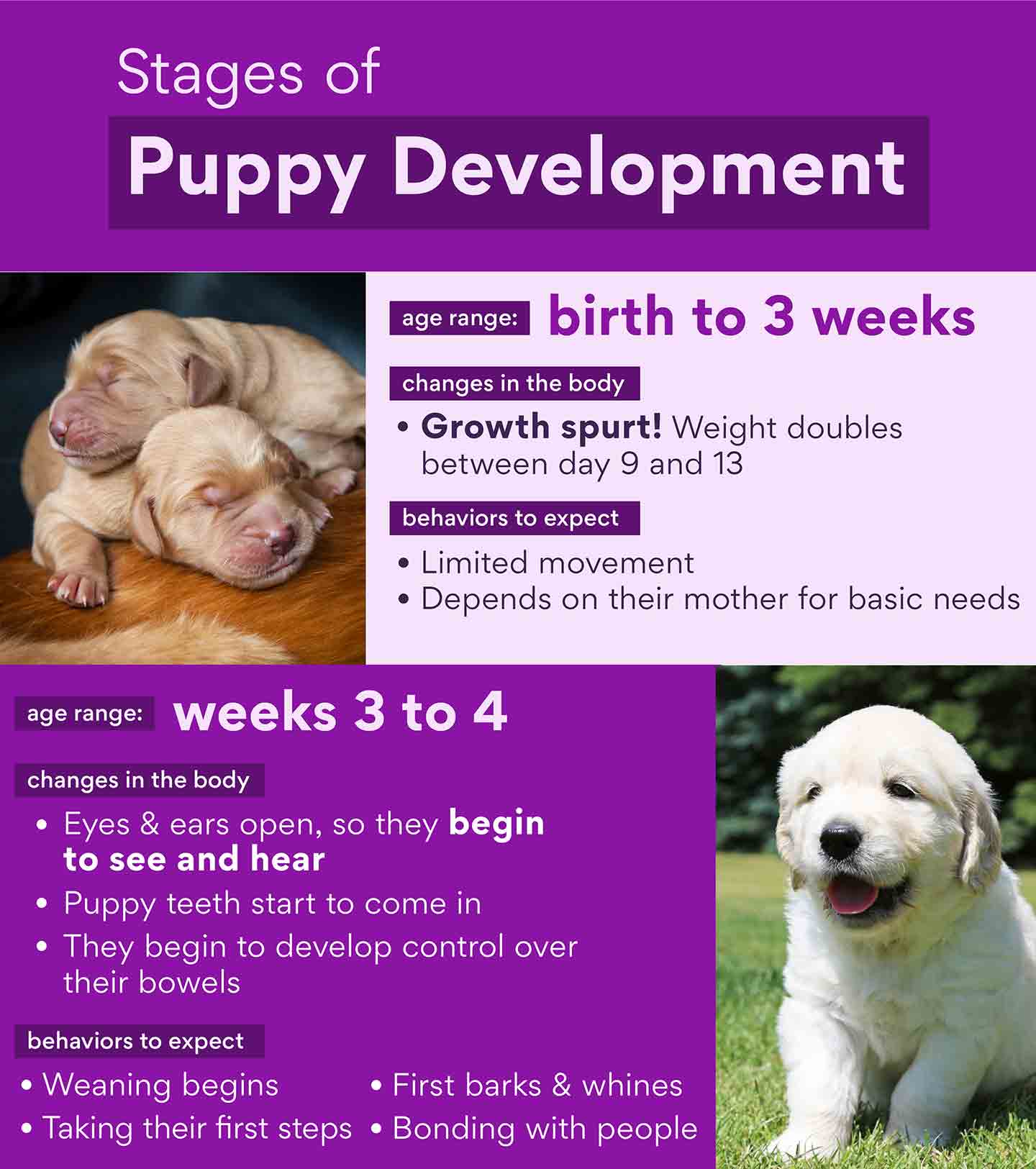
This image is property of media-be.chewy.com.
The Adolescent Stage
The adolescent stage typically occurs between six and eighteen months of age. This stage is often characterized by an increase in independence and challenging behavior. Adolescents may test boundaries, exhibit sexual behaviors, and become more selective in their interactions with other dogs. It is essential to continue providing consistent training, socialization, and supervision during this stage to help shape their behavior as they transition into adulthood.
The Adult Stage
The adult stage begins once a puppy reaches sexual maturity, which is typically between one and two years of age. At this stage, dogs have reached their full physical and sexual maturity. Their growth has slowed down, and they have settled into their adult size. Adult dogs are generally more self-assured, confident, and less prone to impulsive behavior. They require regular exercise, mental stimulation, and ongoing training to maintain their health and well-being.
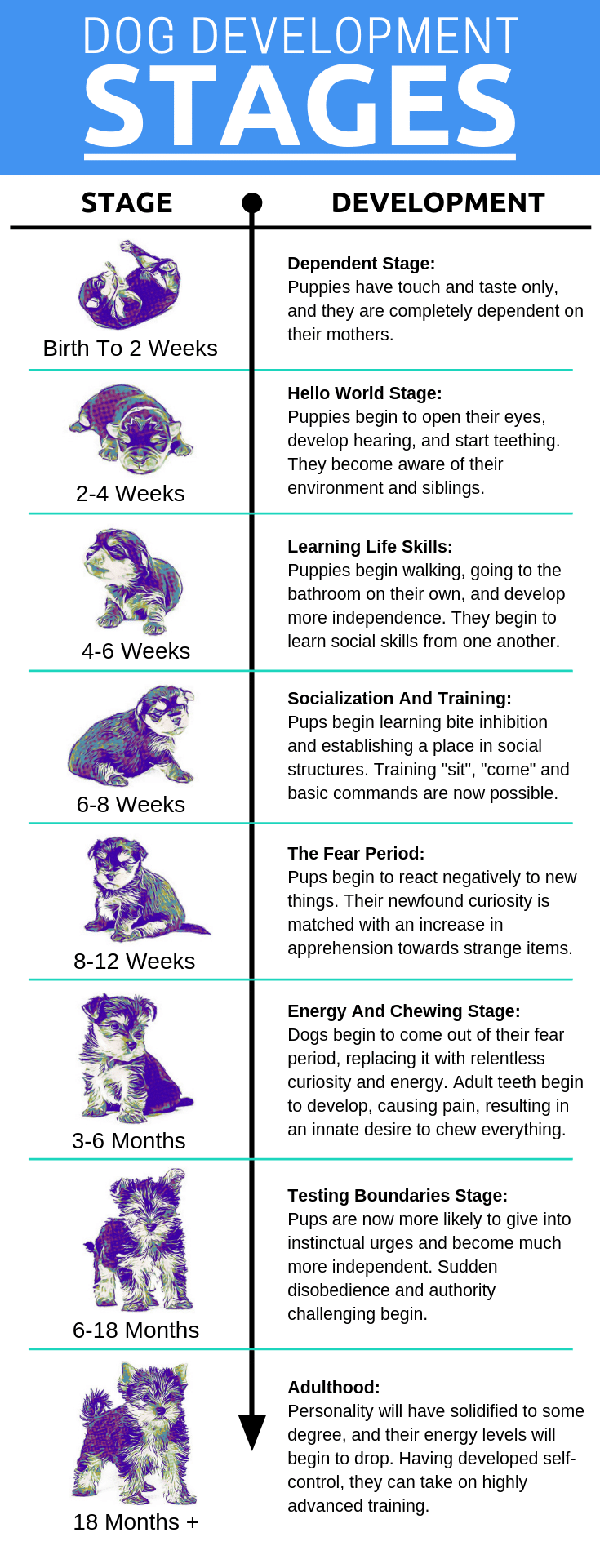
This image is property of i.pinimg.com.
Physical Development
Growth and Size Changes
During the neonatal and transitional stages, puppies experience rapid growth. They double their birth weight within the first week and continue to gain weight steadily. Size changes are most noticeable during the juvenile stage when puppies go through a growth spurt. However, the rate of growth varies depending on the breed, with larger breeds growing at a slower pace. It's essential to provide a balanced diet and monitor a puppy's growth to ensure they develop at a healthy rate and maintain an appropriate weight.
Development of Senses
Puppies are born with their eyes and ears closed, but they begin to open during the transitional stage. As their senses develop, they become more responsive to visual and auditory stimuli. They start to recognize familiar faces, sounds, and scents. Puppies also explore the world through their sense of touch and taste. Understanding and supporting their sensory development is crucial during the socialization stage, as it helps them become accustomed to various stimuli and builds their confidence in different environments.
Cognitive Development
Memory and Learning
As puppies grow, their cognitive abilities develop, enabling them to learn and remember information. During the early stages, puppies have shorter attention spans and may have difficulty retaining information. However, with consistent training and positive reinforcement, they can learn basic commands and skills. It's important to provide puppies with engaging and age-appropriate activities that challenge their cognitive abilities and support their learning and memory development.
Problem-Solving Abilities
As puppies enter the juvenile and adolescent stages, they begin to develop problem-solving skills. They may use trial and error to figure out how to access rewards or solve puzzles. It's important to provide them with stimulating toys and mental challenges to encourage their problem-solving abilities. This not only keeps them mentally stimulated but also helps prevent boredom-related destructive behavior. Positive reinforcement training methods can also enhance their problem-solving skills and promote obedience and good behavior.
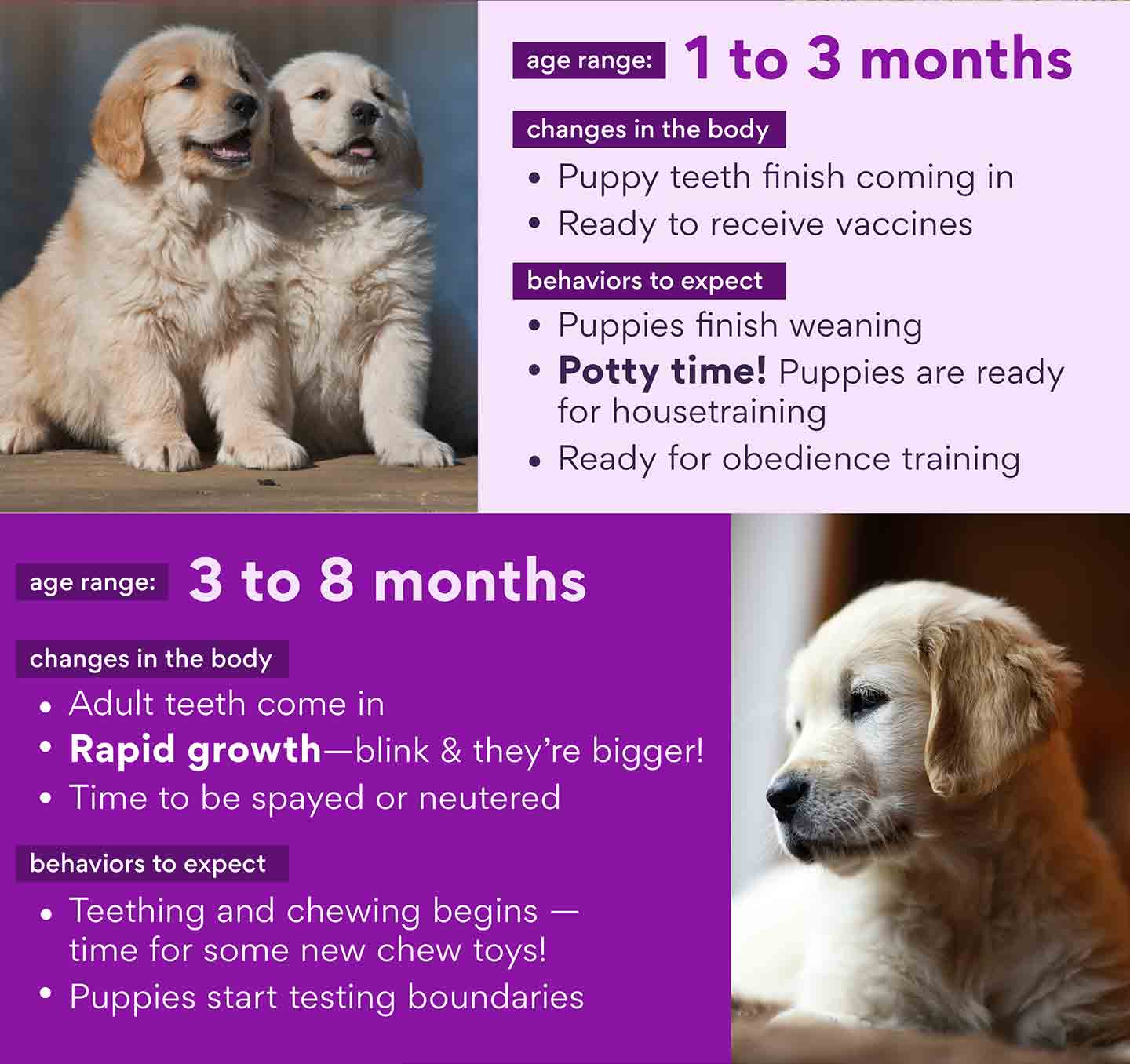
This image is property of media-be.chewy.com.
Social Development
Attachment and Bonding
During the socialization stage, puppies form attachments and bond with their human caregivers and littermates. Positive experiences, such as gentle handling, play, and affection, help puppies build trust and form strong emotional connections with their family members. Establishing a secure attachment early on lays the foundation for a healthy and fulfilling lifelong bond between a dog and their owner. Regular bonding activities, such as training sessions, walks, and playtime, can strengthen the bond and enhance social development even further.
Interactions with Other Dogs
Puppies learn social skills and appropriate behavior through interactions with other dogs. Playtime with well-mannered and vaccinated dogs allows puppies to learn important canine communication cues, such as reading body language and practicing appropriate play behavior. Ensuring positive and supervised interactions with a variety of friendly dogs promotes social development and helps prevent fear or aggression towards other dogs in adulthood.
Behavioral Development
Teething and Chewing
Teething is a natural process during the juvenile stage, where puppies' baby teeth fall out, and their adult teeth come in. This can be uncomfortable and sometimes painful for puppies, leading them to chew on objects to relieve the discomfort. Providing appropriate chew toys, frozen treats, and regular oral care can help alleviate teething pain and redirect their chewing behavior to appropriate items. Consistent and positive reinforcement-based training also helps establish proper chewing habits.
Housebreaking and Training
Housebreaking is an essential aspect of a puppy's behavioral development. Training a puppy to eliminate outside helps establish good hygiene habits and prevents indoor accidents. Positive reinforcement-based training methods, consistency, and a regular routine are key to successful housebreaking. Additionally, teaching basic commands, such as sit, stay, and recall, during the juvenile and adolescent stages sets the foundation for good behavior and obedience in adulthood. Professional training classes or working with a certified dog trainer can provide guidance and support throughout the training process.
Understanding the various stages of puppy development is crucial for providing the appropriate care, training, and socialization that puppies need to become well-rounded and balanced adult dogs. Each stage presents unique challenges and opportunities for growth, and by nurturing their physical, cognitive, social, and behavioral development, you can help your puppy thrive into a happy and well-adjusted adult companion.
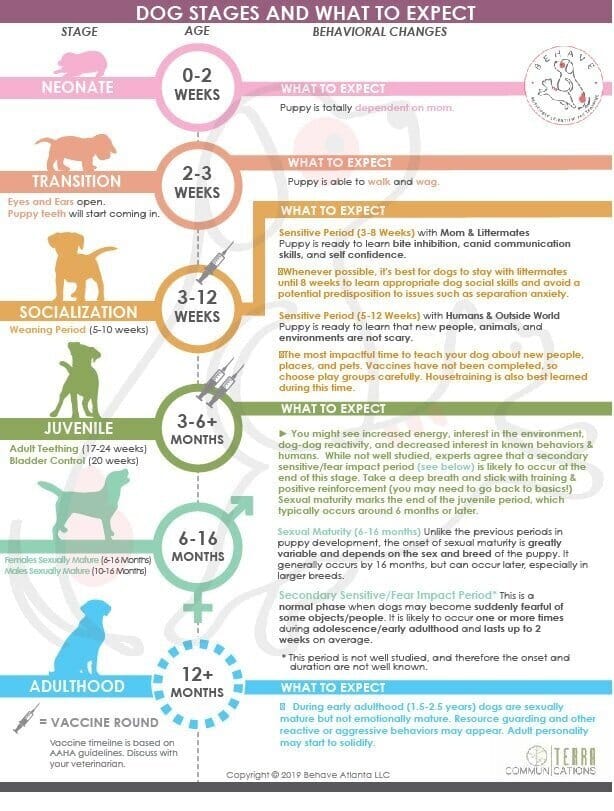
This image is property of images.squarespace-cdn.com.

